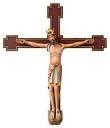
King David had presided over what the Jews would have regarded as their golden age. He conquered his enemies and built up the kingdom of Israel. He was especially chosen by God. Therefore this was the kind of ruler that the people expected their Messiah to be. How different was the bleeding figure, enthroned on a cross and crowned with thorns. Kings are usually richly dressed and are surrounded by courtiers who vie to please them. This king’s court was a stark contrast: it consisted of the leaders and soldiers who mocked him, and the women - voiceless in that society - who followed him together with the beloved disciple. Two men stood out in this motley crowd because their behaviour was unexpected. One was the centurion who, having presided over the brutal execution, proclaimed the innocence and goodness of his victim. The other was the thief, who came later to be known as Dismas (which means sunset in Greek).
Dismas, unlike his fellow bandit, did not ask to escape his punishment which he knew he deserved. Instead he looked at the mangled form beside him and saw a totally different kind of king to those to whom he was accustomed, like Herod or Augustus Caesar. They constantly sought worldly adulation, while the king beside him accepted suffering and humiliation. Dismas realised that he was sovereign of a kingdom where low life like himself would receive both love and mercy. It is as though a parallel world had opened up beside the one he knew.
This kingdom is in fact not remote but is within us; and its King feeds us with himself in the Eucharist. His dominion guides us through the world we experience everyday.
He who would valiant be
'gainst all disaster,
let him in constancy
follow the Master.
(John Bunyan)